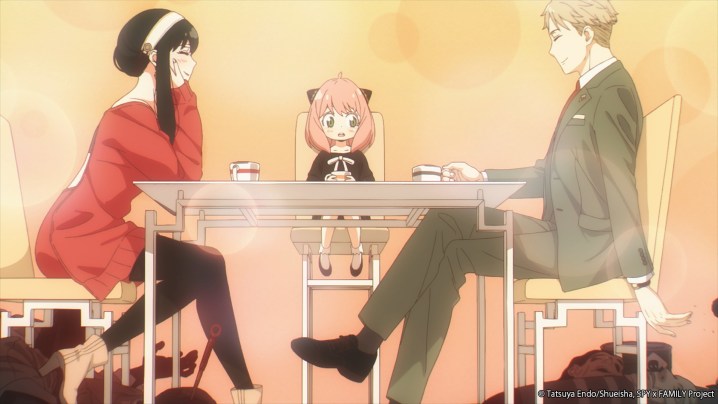Tatsuya Endo’s Spy x Family seems to have struck at the perfect time thanks to anime being more ingrained in mainstream pop culture than ever on an international level. Endo’s original manga series began serialization in Shueisha’s Shounen Jump+ digital magazine on a biweekly schedule, and it’s since transcended its source medium to become an international juggernaut in the anime industry.
It certainly helps that animation studios Wit Studio (Attack on Titan seasons 1-3, Vinland Saga season 1) and CloverWorks (The Promised Neverland seasons 1-2) beautifully adapted Endo’s endearing art style to vibrant effect, but its characters lift a straightforward premise into a thoroughly investing watch. From the blending of genres to innovative art direction to irresistible character dynamics, Spy x Family has a welcome sense of sincerity to it that ties audiences to this colorful cast of unlikely family members.
A refreshing change of pace

It’s unquestionable that some of the biggest contributors to the anime genre that’s exploded in popularity worldwide in recent years fall under the shounen demographic, which has some of the widest-reaching series in manga and anime when it comes to appeal. And while they can come to feel like carbon copies of each other in some ways, the potential in their premises is deep for creative talents willing to realize it.
“Battle shounen” like Jujutsu Kaisen or Demon Slayer expectedly have that MCU-like reach when it comes to mass-market appeal, but Spy x Family has managed to strike all the right chords with that same audience and more with a lighthearted story that keeps “battles” in the back seat. Countless fans have been as enamored with the charmingly dysfunctional yet gentle character dynamics and hijinks of Loid, Yor, and Anya Forger as they have with the Game of Thrones-like political intrigue and brutal action of Attack on Titan this year.
It’s a refreshing series that brings things down to earth without losing the medium’s inherent penchant for fantastical and over-the-top settings. At the same time, Endo’s characters, story, and world are executed in a way that knows just how much it should take itself seriously, when to lighten up, and when to feel emotionally genuine all at the same time.
And as corny as it sounds, that’s as perfect a reason as any for fans to indulge in a bit of escapism, root for the Forger family, and feel cozy and right at home in its stylish 1960s-inspired world.
The perfect mix of comedy and feel-good storytelling

Given the charming premise that the main cast of characters finds themselves in, it would be easy to fall into an overbearingly cheesy story filled with exaggerated reactions, low-hanging jokes, and fan service. However, Spy x Family avoids the tacky pitfalls that typically scare away the uninitiated.
Throughout the series so far, there’s been a tasteful balance of comedic relief and sincere, heartfelt storytelling revolving around the main trio. The general structure of the story is fairly simple: A world-class spy is tasked with creating a fake family to tackle a high-stakes diplomatic mission, which ironically proves to be his greatest challenge yet.
However, the distinct personalities of the Forger family make the plot an engaging one, and each of their motivations for taking part in this initially farcical dynamic believable without feeling like the show is struggling to nail down a consistent tonal identity.
Loid’s backstory as a war orphan turned spy, Anya’s as an orphaned telepath yearning for a family, and Yor’s choice to support her little brother be being an assassin are all excellently used as vehicles for emotional character arcs and natural sources of comic relief without undercutting emotional moments. ther are even touching undertones of antiwar themes that manage to not wallow too much in preaching.
A revitalization of old sitcom tropes

“Charming” is perhaps one of the best adjectives to describe Spy x Family, and it can’t be emphasized enough how well it conveys its charm without feeling too derivative. That success becomes even more impressive since it uses arguably one of the most derivative genres in TV history as its inspiration: the canned-laughter sitcom.
From the aforementioned ’60s/’70s aesthetic of the fictional world the Forgers live in — that’s somehow also modern at the same time — to the structure of this lovably unique nuclear family, Spy x Family takes classic sitcom tropes from Western TV and manages to make them feel refreshing again. Loid functions as the family “straight man” husband, Yor is the breezy wife, and Anya is the lovable Michelle Tanner-like daughter.
These are all sitcom tropes that have been done to death and back, yet Endo deftly puts his own spin on them with his Spy x Family cast. Even with the exaggerated and melodramatic reactions to jokes that seem to try to hit audiences over the head in both live-action sitcoms and anime, none of the main characters feel like lazy caricatures.
Anya, for instance, could have easily been an infuriating character in just about any other series. Instead, her personality, coupled with her motives, allows her to come off as equal parts endearing, funny, and witty. She doesn’t overstay her welcome, and since she could’ve been the first character to backfire narratively, Loid and Yor pretty safely earn their place in this story as well.
Spy x Family blends all of these elements to be the perfect cocktail of narrative serotonin, and the more-lucrative-than-ever anime industry is made all the better for it. It’s a show that both appeals to longtime fans of the genre and new viewers curious about anime. As such, it has the capability of being the next best crossover hit ripe for live-action adaptation.
The first 12 episodes of Spy x Family season 1 are available to stream on Crunchyroll and Hulu, with episode 13 premiering this October.



